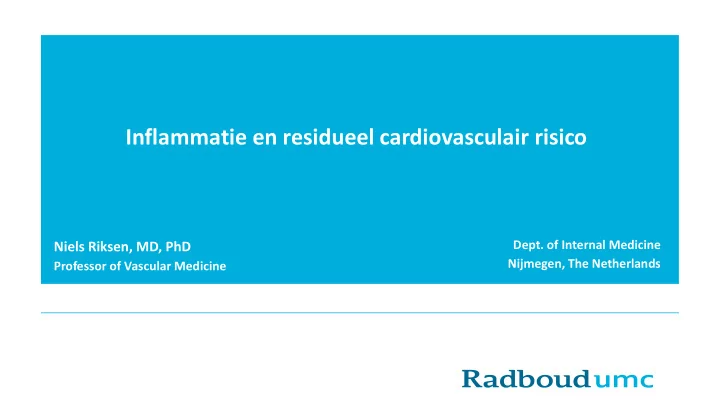

Inflammatie en residueel cardiovasculair risico Dept. of Internal Medicine Niels Riksen, MD, PhD Nijmegen, The Netherlands Professor of Vascular Medicine
Disclosure potential conflicts of interest
Residual risk Residual risk Sabatine, NEJM 2017, FOURIER
Residual risk Lawler et al, Eur Heart J 2020 [ahead of print]
Inflammation Biological response of the body to harmful stimuli, involving: • Immune cells • Blood vessels • Molecular mediators Characterized by: • Dolor Pijn • Calor Warmte • Tumor Zwelling • Rubor Roodheid • Functio laesa Functieverlies
Targeting inflammation Zhao, JACC 2019
Recent large RCTs COLCOT CIRT CANTOS Canakinumab, 50-150-300 mg, sc every 3 Methotrexate, 15-20 mg/week Colchicine, 0.5 mg/day months N=4786 patients with previous AMI, N=4745 patients within 30 days after N=10.061 patients with previous AMI, and DM type 2 or MetS AMI, and hsCRP > 2 mg/l and hsCRP > 2 mg/l No selection on hs-CRP Cave more pneumonia More fatal infections/sepsis Tardif, NEJM 2019 COLCOT Ridker, NEJM 2017 CANTOS Ridker, NEJM 2019 CIRT
Residual inflammatory risk in CANTOS Ridker, Eur Heart J 2020
Colchicine: LoDoCo2 Nidorf et al, NEJM 2020
Colchicine: LoDoCo2 Nidorf et al, NEJM 2020
Colchicine: mechanism of action Nidorf & Thompson, Clin Ther 2019
Mechanistic insight into the LoDoCo2 N=174 patients in run in phase 1. Monocytes/macrophages Targeted proteomics, 184 proteins - IL1 pathway - Clonal hematopoiesis Attenuation of NLRP3 inflammasome: 1 2. Neutrophils - ↓ IL 18 - ↓ IL 1 RA Largest reduction in proteins involved in 2 neutrophil degranulation Opstal, Circulation 2020
Atherosclerosis: role of monocytes and macrophages Libby et al, Nature 2011
The interleukin 1 pathway IL1 family members of cytokines Abbate, Circ Res 2020
Interleukin-1: local effects Libby, JACC 2017
Interleukin-1: systemic effects CRP Kaptoge, Lancet 2010 IL6 Ridker, Circ Res 2016 Ridker, Circ Res 2016
The interleukin 1 pathway and atherosclerosis Vromman, Eur Heart J 2019
Activation of the innate immune system in CVD Riksen & Stienstra, Curr Opin Lipidol 2018 Bekkering, Atherosclerosis 2016
Clonal hematopoiesis of indeterminate potential (CHIP) Courtesy to Alexander Hoischen Libby et al, JACC 2019
CHIP and CVD TET2-/- 10% TET2-/- 90% TET2+/+ More IL1b Due to ↑ NLRP3 act NLRP3 inhibitor Jaiswal, NEJM 2017 Fuster, Science 2017
Atherosclerosis: role of neutrophils Nahrendorf, Science 2015 Doring, ATVB 2020
Neutrophils associated with future CVD Rotterdam study cohort 7,730 participants, without CVD at baseline 2002-2008 Fani, Plos Med 2020
Neutrophils associated with present atherosclerosis Fani, Plos Med 2020
Evidence at the progenitor cell level? Study participants Men with/without severe coronary atherosclerosis Optimal lipid lowering therapy Marlies Noz Laszlo Groh Exclusion of CVD, DM2, AID Outcomes Immunophenotype in circulation Immunophenotype of the bone marrow Innate immune response Progenitor cell response Metabolism of monocytes and progenitors Agatston or Total plaque score Control Participant LPS and P3C Patient CAC:1-400 and TPS>4 Circulating PBMC’s Patient Bone marrow progenitors CAC>400
Many CVD risk factors affect bone marrow progenitors Schloss, Circ Res 2020
Take home messages Despite optimal risk factor control: residual inflammatory risk Elucidation of mechanisms key to develop/select specific anti-inflammatory drugs Colchicin effective in lowering CVD risk This suggests important roles for Inflammasome/IL1 pathway Neutrophils Novel pathways to explore: Reprograming of circulating innate immune cells and bone marrow progenitors Clonal hematopoiesis
Recommend
More recommend